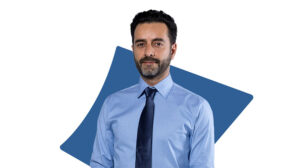- PODCAST
Lead With That: DNA Analysis Ethics and the Importance of Leadership Transparency

In this episode of Lead With That, Ren and Allison discuss the DNA analysis company 23andMe, and what its challenges mean for consumers in the ever-evolving digital landscape. 23andMe and other organizations in the DNA analysis industry have revolutionized personal genomics and empowered millions of people to gain access to their genetic information. But now that their business and success are faltering, many questions are arising surrounding the collection and use of genetic data.
As the future of this industry becomes more and more uncertain, consumers are wondering what this means for their data and DNA privacy, and how leadership and ethical business practices — or a lack thereof — influence their lives. Especially in our digital world, where it’s almost impossible be a consumer without allowing some companies access to our personal information, what role do transparency and trust play in leadership?
Listen to the Podcast
In this episode, Ren and Allison discuss the recent challenges of the DNA analysis industry and the implications these struggles have for consumers. While the organizations in this industry have provided many with valuable information about their DNA, what responsibility do they have to protect consumer information when things get tough and hard business decisions must be made? Ren and Allison explore what leaders can learn about the importance of transparency and trust from this situation, and lead with that.
Interview Transcript
Intro:
And welcome back to CCL’s podcast Lead With That, where we talk current events and pop culture to look at where leadership is happening and what’s happening with leadership.
Ren:
Today, we’re diving into the world of direct-to-consumer DNA analysis. Companies like 23andMe and Ancestry.com have revolutionized personal genomics, empowering millions to uncover their ancestry and even get a glimpse into their health risks. And some of these pioneers now in genetics who soared to billion-dollar valuations now face some staggering challenges.
Specifically, with the stock value plummeting by 99% and a recent mass board resignation, 23andMe, the one-time genetic giant, is on the precipice of disaster. As 23andMe teeters on the brink of collapse, we’ll explore the implications for the millions of people who entrusted them with their most personal asset, their DNA.
The collection and use of massive genetic data raises urgent questions about privacy, leadership and ethical business practices, and how to navigate the fallout when business models fail. And as the future of these businesses becomes murky, we have to ask, what happens to all that sensitive genetic data of over 15 million customers? What happens to your genetic legacy when a company’s business and leadership falter?
While 23andMe’s product was groundbreaking, a combination of market saturation, privacy concerns, leadership struggles, and an unsustainable business model have led us where we are today. So, stick with us as we unpack the lessons on leadership from this unfolding story, how visionaries in the genetic space revolutionized an industry, and where they may have gone wrong in managing the responsibility that comes with it. Let’s get to it.
Welcome back, everyone. I’m Ren Washington, and as usual, joined with Allison Barr. Allison, have you ever used a genetic testing service?
Allison:
I’ve only used it for my dog. And I’m going to guess we’re talking about humans here, but I did use it for my dog. And if you had seen my first dog, you would have thought that he was a German shepherd, but we knew he was a mutt. And it came back that he was part Dalmatian, which made me very skeptical of the results. But hey, you never know. So I’ve used it for my dog, but not for myself. What about you?
Ren:
Were you satisfied with the results? You said you were skeptical, but did it work?
Allison:
Yes. Well, it worked because, and don’t judge me, I was much younger, I had to submit proof to the apartment complex that I was applying to live in that I didn’t have —
Ren:
Sure.
Allison:
… a German shepherd or “bully breed.” And I said, “Here you go, he’s part Dalmatian,” which … So yes, I was satisfied for that from that perspective.
Ren:
Well, see, now we’re starting to already get into the scary parts about genetics, like access. Every time I talk about this kind of discussion, I think about the movie Gattaca. Have you seen the movie Gattaca?
Allison:
No, I’ve never seen it.
Ren:
Yeah, see it. Young Ethan Hawke, young Uma Thurman. It’s really just a story about overcoming the limitations that society puts on us, Allison.
Allison:
Okay.
Ren:
But do you know anyone who’s ever done one of these genetic testing things?
Allison:
Yes, my sister. Uh, now I’m questioning if it was my sister. Somebody in my family did it many years ago. So I suppose what we’re getting at, part of what we’re getting at is, by proxy, I guess my data is out there.
Ren:
Oh that’s interesting. Some of your genetic data, because you’re related to the people, is out there.
Allison:
Yeah.
Ren:
Yeah. I’ve never used one of these, but when I brought this topic up to Heather — my wife, for those of you who are listening, and I’m trying to make a concerted effort just to call her Heather instead of my wife, because she’s a multifaceted, complex human being — but when I told her about this topic, or we’re talking about 23andMe, and she’s like, “Oh, what about it?” I said, “They’re about to be bankrupt.” And before I could even talk about the topic, she looks at me and it’s like, “What’s going to happen with all that data?” Because it’s like, her, and I think her parents have done it.
And so yeah, I have personally never found the desire, like 23andMe or Ancestry.com, I actually don’t even know what their value propositions are or how they differ, but I think maybe that’s sort of one of the things we’re starting to talk about today.
I think some of this story is rooted in the product and the business. I can’t help but think about Shark Tank, where they always talk about, do you have a product or do you have a business? Even for people who use the service once, I don’t know, if you map my genes, haven’t we won? You’ve mapped my DNA, so we’re finished, aren’t we?
Allison:
Then what? Then what? In theory, as I understand it though, some people have used it to find family members that they’ve lost or didn’t know existed. There are some who say it’s helped them to understand their potential health risks. But to your point, what’s next after that, in terms of what the company offers? I’m not really sure. There’s a lot of different ways that we could take this, I suppose. And I think one thing that you just raised was business or product, and I don’t know how long we want to talk about the CEO of 23andMe, but one of the reasons that the board eventually left the company was because she couldn’t provide a business plan that was either sensical or sustainable. So that’s an interesting question that you raise.
Ren:
Yeah. Well, so Anne Wojcicki, the CEO, facing a lot of criticism over kind of the company’s financial struggles, but her approach. So when 23andMe went public in 2021, its opening price was like $13.32. Then it started to raise by 20% before it dropped down to where it was trading yesterday at 29 cents. I guess I could look. But that’s where that 99% drop comes folks. It’s not hyperbole. It went from 13 —
Allison:
Right.
Ren:
… and plus to less than a dollar. And so her pitch to the board was, “Let me buy you all out. I’m going to make it private. I’ll give you 40 cents a share.” So it opened at 13. While she’s not offering them 30 cents, she’s not offering them much, so people were pretty pissed about that. And I think the board cited concerns about the lack of premium, of course, but also the overall insufficient way to protect the shareholder value. And they don’t know what she’s going to do with the business. So I don’t know. It’s interesting to explore how much of her … Could any CEO save them?
Allison:
I don’t know. I guarantee you there are probably people out there who are incredibly innovative also in that industry who could think of many different ways to sustain customers or have client retention or … It just to me, from the outside looking in, does not look like you’d have any sort of retention or any incentive really for one consumer to come back, right? Even further, your family then doesn’t need to. There’s no incentive for your family, either. So I don’t know. Again, I’m sure there are probably some innovative people out there who could think of many ways that they could add to their product line, so to speak, but I’m not in that business. What do you think?
Ren:
Yeah. As I asked, and I am listening to you talk, I was thinking about that discussion we had once with the grocery stores, like merging, and then cutting off and selling parts of the business. I guess what you just alluded to was that there may not be a family need. Because if you get ancestry in me and I’m your sister, and then I find out where your history’s from, then I now know where mine is, presumably. I don’t need to get it also to know that we have French ancestry. So maybe that’s something like your diversification there. I guess there might be some additional add-ons for the genetic testing and some of the, “Hey, we’re continuing to map XYZ DNA. We’ll update you. Get a subscription service.”
Allison:
Right.
Ren:
But yeah, I guess there might be a CEO who could innovate the business model, but I don’t know if the product, what can change. And that’s what happened with 23andMe, and all of them. At one point, I think … Who knows who got there first? Remember? I think it was just a show on TV where they brought celebrities and they told them where they’re from, and then that kind of evolved into this business model.
But as soon as there were major players in this space, there were many players in this space. You can spit into a tube today for almost any company, and they’ll tell you and what your dog are supposed to be. And so I think maybe the innovation doesn’t come in the product, but the innovation comes in the relationship with the client. And maybe even then, the relationship with other businesses. They’re going to have to have an inorganic growth strategy to make this happen,
Allison:
Sure.
Ren:
… which is to say some of them are going to have to merge and acquire one another, I think.
Allison:
Sure. And I could think of it, too, going many ways. Part of my family is Italian and part of my family is Irish. I could almost see there being some tie to travel. Okay, now that you’ve done this, now you can partner with whoever agency to get a trip to wherever to visit your homeland, so to speak. So yeah, I think to your point, they’re going to have to do something. And there were so many other things that came up for me with this story, too. And I don’t want to take us too far down like a philosophical rabbit hole, so humor me for a minute.
Ren:
No, those are my favorite. Please, let’s dive in.
Allison:
Okay, good. Humor me for a minute. So on the one hand, technology and AI as we know it are moving very quickly, almost to the point where humans can’t keep up with as fast as they’re moving. So on the one hand, I think about data breaches, which happen to any company. So any company is at risk of a data breach. But when you’re talking about genetic information, that’s unchanging. That’s people’s very personal information. It’s not like I could just change my password, and then all of a sudden, the person who hacked no longer has access to my DNA. It’s such a much bigger risk, to me. It’s just interesting. I’ll pause before I take us down the other rabbit hole.
Ren:
Well, I’m just grateful that, I think you alluded to a little bit of it, maybe the world is so far advanced. I don’t know if anyone on the dark web, for instance right now, someone has your, Allison, your Social Security number. I’m convinced of it because they have mine.
Allison:
Oh, sure.
Ren:
Because I am attached to Sony. I’m attached to Experian. They’ve had massive data breaches that have my personal information on it. They’re like, “Change your password so someone can’t use it,” but that stuff exists and is being peddled in a massive file of tens of thousands of other people’s data. So I guess I’m probably glad that, right now, no one can take my genetic information and synthesize a new version of me and make me better and stronger.
Allison:
Right.
Ren:
Thank God there’s not a black market for cloning science. Though who knows? There might be. But I think I’m grateful that there’s nothing to be done with that. But maybe as we ponder this, it is like, someone has it. Someone’s going to hold onto that database, and I guess leverage the information until we’re societally advanced enough for it to be used. And so I guess maybe … I don’t know if you had a question necessarily so much as, I guess some of the advantage of the fact that we are leaping ahead, technologically, we can collect this data, but what is someone going to do with it? Is a hacker going to … like they would hold my computer hostage? “Hey, if you don’t pay me, I’m going to email your genetic code to your workers.” It’s not like NSFW stuff. It’s like —
Allison:
Right.
Ren:
“I’m going to email this guilty picture of you to your coworkers. I’m going to let everyone know that you have an ABG genetic coding.” They’re like, “Don’t do that to me.”
Allison:
Right.
Ren:
So I don’t know. I guess what are they going to do with it?
Allison:
I don’t know. Right? That’s the question. And I fall in suit with you, where I’m kind of like, okay, well, I already got hacked once and somebody has my social already, and that’s not changing either. My Social Security number is not changing. You do all of the things to protect yourself so that people can’t buy a house or whatever with your social.
So part of me also has a high level of trust that we will catch up to it. And whatever folks are thinking they’re going to do with people’s genetic information, I have a certain level of trust in me that policyholders or whomever will catch up to that so that there is a solution, but I do know that’s one worry that folks have.
So no, I didn’t necessarily have a question, just something to ponder. But the other thing that was top of mind for me just got me thinking about the future of leadership in general and how complex challenges are now and will probably continue to be.
So I’m getting way broader right now, so you can rein me in if you want, but even consumers, too, are going to face challenges that are new that we almost can’t predict necessarily. And I know you and I have talked a little bit about this before, but I do think the degree of complexity for leaders right now is dialed up, and will continue to probably be dialed up, again because technology is just moving faster than our understanding. So what are your thoughts?
Ren:
Well, you used a really important word, trust, and then a couple of things are spinning around in my head right now, especially as a leader and a consumer. I think … And I was about to say, never more in history has your education been more important about what you consume or what you lead, but I don’t know if that’s true. If you were in the horse industry and the cars were coming along, you needed to be pretty freaking aware of how your industry was going to die.
And so I wonder too, some of what I was about to say previously was, I think for some of these genetic companies, they’re almost like Kodak or Blockbuster. They were swimming in the money. They couldn’t see past their own success to the inevitable evolution or the desire of it. And so I think, too, leaders are going to have to be aware of what can happen with this information, how to navigate it. When I think about 23andMe, I think about being informed.
Allison:
That’s it.
Ren:
As we think about information that’s either being given away or being taken away. A leader has to know … No one can point their finger and talk about, “Oh, well, you knew the risks here, and now your private information or your genetic data is in the hands of so-and-so.” Someone will try that, but it’s not working for Anne. And so there’s something coming up for me, this idea of accountability, of curiosity, of balancing between …
[Sneezes.] Excuse me. Keep that sneeze in. It’s human.
Allison:
Bless you.
Ren:
Thank you.
… of balancing that nature between how much can I delegate? I need someone else. I need an expert who’s going to manage this stuff. And then how much should I really, really know? And so there’s something in there for me around, like, I’ve got to trust the people I work with, and I cannot put some of these decisions in the hands of someone I don’t trust. Moreover, I’ve got to trust that this person knows what they’re doing because when we’re in the forefront of this information, someone’s going to know. Someone knows more about AI right now than me. They could use that for nefarious means, or they could use that for positive means. And so, as someone who’s driving the ship, I’ve got to know who I’m putting my trust in.
Allison:
Absolutely. So how do you know?
Ren:
How do you know who to trust?
Allison:
Yeah, I know that’s a really big question I just asked you. We can narrow it down. Let me get very specific. Who are you going to trust to know and foreshadow AI conditions that will potentially impact your job and your work? Put yourself in the shoes of a CEO even. How do we know? Sure, you can hire a CTO. You can hire people who have advanced degrees in technology. Is that enough? I don’t know.
Ren:
Yeah, I think you’ve got to trust what you’re trying to accomplish. And that’s an interesting idea, because is that what 23andMe did? It’d be interesting to talk about, what were they trying to accomplish? Did they ever have a conversation about the evolution of their business?
But I guess for now, when we start to carve into these frontiers, I have to trust some expertise. I have to trust someone whose character is reliable, but also willing to flex. I got to trust my competitors, too. There’s something about … if you can run a 4-minute mile, then I can liberate my thinking to run a 4-minute mile. Sometimes all of our success is my success. And that’s not too far away from some of our frame of reference on leadership.
But I think, starting to comb out who you might want to rely on, but also asking yourself, well, what am I trying to do? And then make sure that I can cultivate trust in the idea and then cultivate someone’s trust in the connection in that idea.
But I don’t know. Especially when we talk about 23andMe, and we talk about, just, the way they try to keep their business alive will sell genetic data. And now, albeit it’s anonymous, but they’re like, “Hey, we’ll sell information to pharmaceutical companies for drug discovery.” And so I don’t know, is that … I guess I can trust them to do what they need to do, what they’re rewarded, incentivized to do. So, how do you answer that question though?
Allison:
Oh gosh. I should have known better than to ask you, because you’re going to ask me back.
Ren:
Yeah. Yeah. You know I’m coming for you.
Allison:
I don’t know. I’m not sure I have the answer right now. But you mentioned something about having people around you who can consider, or start to investigate, the evolution of your business and how you need to evolve. And I thought that was a really interesting thing to say, and an accurate one, even more so than ever, having folks on your team or within your business who can think about now, right now, how you might need to evolve your business. And I would think that’s relevant to any industry. Can you convince me that’s not relevant to any industry?
Ren:
Well, I don’t know. Probably not. I guess the sentiment of your question is no. Everyone needs to innovate, but think about some things that don’t change. When’s the last time a table changed?
Allison:
There are all kinds of tables out there, Ren.
Ren:
Yeah. When was the last table invented? I hear you. I guess some of the principles might remain because actually I’m thinking of … I just saw this clip of these new compact furniture that … a table turns into a shelving unit, like 4 shelves, and then flattens out and turns into a table.
Allison:
Right.
Ren:
Yeah. I guess all things need to innovate. I guess you’ve got to trust someone to be honest with you, trust not to have a bunch of yes people around you, and then trust to learn the balance between that innovation and that steadiness.
Because it is an interesting tension that 23andMe, or all this DNA mapping, is maps like innovations in science. But then if it hangs its hat solely on the innovation of science, then it’s hanging its hat on something that happens every 30 or 40 years, maybe faster, but still it’s like, all right, when’s the next big genetic wave of materials, products, I don’t know, coming along? Who knows? They’re waiting too long.
So it’s like, yeah, innovate your product and then innovate your business model. Hold on to what made you unique, which is selling DNA mapping. But then maybe like you said, how do I evolve? Do I look for partnerships? Find out where you’re from, and then we will link you to Expedia or something where you can freaking —
Allison:
Right.
Ren:
… get a ticket. Yeah, broadening your mind, not getting too stuck on your own idea. Like authors, be willing to kill your darlings. It’d be interesting to explore what things they tested in the market, but it just seems like they doubled down on the idea of selling DNA kits for the past 2 years.
Allison:
Right.
Ren:
And it has not worked.
Allison:
Yeah, understandably. And if it’s okay, I want to broaden us again so that for those folks who are listening who are not in the industry, have also just some things to think about.
I was speaking with one of our brilliant colleagues, Renita September, who also has the best name, Renita September, who was sharing some research with me around the future of leadership and future of the future of work, future trends, and some of the research that we found was that economic pessimism, as she called it, will dramatically impact how leaders lead and how workplaces operate.
And I know this is kind of a bit of a turn for us, but I’m just wondering if we can talk about that a little bit, because part of what we’ve already mentioned, part of what will impact these industries as well, is if their consumers trust them. And part of economic pessimism has to do with lack of trust. And so, how can organizations continue to gain their, not only their consumers’, but their employees’ trust, given some of the obstacles that the world is facing right now?
And I’ll say one more thing about that before I let you answer, is that she and I also talked about how things that occur across the globe from you, no matter where you are, will impact your business in new ways now that leaders didn’t necessarily have to consider maybe 15 years ago. So, any thoughts, reactions?
Ren:
Yeah. What was the term? Economic what?
Allison:
Pessimism.
Ren:
Economic pessimism. God. Well, coming from a pessimist, this’ll be fun. Well, I have this idea, thinking about, gosh I think about structures of economics and governance. The stock market’s an interesting animal, and so too is crypto. If you believe in the idea of cryptocurrency, that it’s not going anywhere, then it’s a good investment. And … a no duh, Ren. Wow, you’re saying something novel. But so, too, goes the stock market. If you believe in the US economic system, or rather the global economic system, the stock market is a good bet because what you’re doing is you’re betting that people who are incentivized to keep that economy alive will keep it alive.
Allison:
Right.
Ren:
It’s ultimately what you’re saying to yourself. And so I guess when I think about some of my reactions to this idea of trust, it’s how can you as a leader or an organization, or me as your customer, how can you incentivize or demonstrate to me that your idea is tried and true? And maybe it’s just like, do I have to believe in your product, or can I believe in you? And there’s something about the sustainability, too, to believe in us. Not just believe in the product that I bring, but believe in the industry that we are creating.
That was sort of what solar’s early pitch was. And granted, solar got … I think they got flushed into a public market too soon, and a lot of people paid for that. And solar could be further along, I think, in human adoption than it is right now, but a lot of solar is not just betting on me as your purveyor, but betting on us as the industry. Our competition helps us give you a better product.
And so maybe there’s something in there. As an organization or a leader, how can you use competition to your advantage, and then tell people, “Hey, this isn’t just for our betterment, it’s for your betterment?” I don’t know. That’s sort of what’s cooking for me.
Allison:
Yeah, that’s interesting, and I think there’s probably a lot to say there. And I want to go back to something that you mentioned a few minutes ago, which was around … you mentioned something around accountability, too. And something that another researcher of ours, Marcia Dawkins, who’s a brilliant, brilliant author, she asked me this question once, rhetorically, of course, but I’m curious, what we can dig into here is, how can an organization balance the need for strategy and public accountability to sustain a business? That was a very interesting question. And then she simplified it to the question of, what does it mean to be a trusted partner or a trustworthy brand?
Ren:
Public accountability.
Allison:
What’s that?
Ren:
Public accountability for what though?
Allison:
Well, I think there’s probably a lot of things that we could say. I’m cautious because I don’t want to take us down a rabbit hole that will turn into sound bites. I think trusting information, trusting sources, sharing sources that are “trustworthy.”
Ren:
Frankly, we don’t live or operate in an economic system where many people have enough buying power to hold organizations accountable. Moreover, the regulations and governance they experience don’t require them to be accountable.
I think conscious capitalism is, whatever, increasing in some vogue, and new generations want new things from their consumers, but not when you dig into supply chain. Anyone who’s talking about global warming and also is wearing clothes is engaging in some kind of cognitive dissonance. Unless you out there had made your own clothes, or you’re one of those really, really serious people, and I know a few of them, who look at the supply chain of their clothing. And I’m not blaming any of you or any of us. Frankly, I’m wearing clothes right now that I know were not made in the best human or environmental conditions.
Allison:
Right.
Ren:
And there’s got to be some kind of withholding of your own culpability. So how do you become a trusted brand? There’s probably a few ways. You could engage in the illusion that people are buying into, helping them not feel too badly about their decisions. I think consistency is something. Offering somebody a unique product, but then continuing to offer more.
And so maybe that’s where 23andMe came. Do I trust 23andMe to do genetic coding? Yes. Do I trust them to do anything else for me? No.
And so maybe there’s something about the variability of your business. I cultivate trust in Apple, for instance, because it’s pretty, it’s fast, it’s smart. They have great customer service. They have a built-in ecosystem for blah, blah, blah, or blah.
I think maybe once you start to unpack your brands, you start to realize that they aren’t a one-trick pony, to say. And maybe this is a full circle for us here around 23andMe is, as a leader, part of your job is to make sure that you’re reveling in your success and you’re looking for the next one.
Allison:
Yeah.
Ren:
So a long answer to your question, as is my way.
Allison:
Yeah, that’s all right. Yeah. I think too, what’s interesting, and this is a me thought, not a CCL research thought, a me thought, is that as sustainability becomes more of a conversation in the masses, I have a curiosity around some of the brands, like Apple and some of the larger brands. I’m an Apple user, by the way, because let’s all knock on wood before I say this, but their products last, and so I’m not having to replace it every 6 months or so. I believe in their product. It’s user-friendly. It’s easy for me to use as well.
And as we learn more information about sustainability, now I’m not talking about Apple, I’m just talking broadly about a lot of different organizations … Like you said, do consumers have the “power” to change the way major companies operate and their contribution to things like global warming and the environment?
Ren:
Coordinated, yes. But some of what you said earlier, trust too, it’s Maslow’s hierarchy of needs, just basic human psychology, that if you’re worried about where your next meal is coming from, you’re not elevating your conversation to what brands I trust or what their supply chain looks like.
Allison:
Sure.
Ren:
And so, when we think about most Americans, or most people involving in modern Western economic systems, most of us fall in the middle to lower range of what we can or cannot do in that space. And so we’re probably having different conversations about trust because we’re too worried. Like, I don’t have the time to do the research, nor do I have the money to get the goods that are like this. We talked about with Bryan Johnson and his blueprint protocol, it’s like the things that are good for you and potentially good for the environment are not accessible by most people.
So it’s like, consumers … don’t get me wrong, I think consumers can change the world. They do change the world … coordinated consumption. And then, too, enough when … I have to address some other people’s needs before I start pushing them to think maybe differently about where they buy their cotton T-shirts from.
Allison:
Sure. Yeah. I realize that just took us a huge left turn, so thanks for humoring me.
Ren:
Well, I don’t know if that is a huge left turn. I mean, I can see a few anchors into this idea of the business, and leading in this business, and some of this idea of … How many people listening actually give a crap? Who’s invested in 23andMe right now? Would it matter if they shut their doors? Is this a relevant and useful conversation? Now, that’s … I think there’s plenty of connection.
Allison:
Yeah. Yeah. When I read about 23andMe, it just took me — and it still continues, in this conversation, to take me — broader, and what does that mean for organizations that are not in that industry? What does it mean for the future of work as we consider not only just people’s data, but again, the advances of technology? You mentioned … You didn’t say these words, but what you were alluding to is things that are systemic that one consumer likely isn’t going to be able to change by themselves, right?
And so again, when I think about trust and I think about the future of leadership and the future of work, I can’t help but think people just have to collaborate in new ways and in different ways. And what does that look like? I’m not really sure yet. But brain power, bringing different minds together that you wouldn’t necessarily bring together, today, right now, is going to be a necessity for organizations to stay ahead of those trends.
Ren:
And transparency.
Allison:
Yes.
Ren:
We talk this idea of leadership disclosure. Ask for more feedback. Share more about why you make the decisions you do. And when I think about Anne’s relationship with the board at 23andMe, I wonder how much Johari window she’s doing. That’s inside speak, folks, for what I just said. It’s like, is she getting enough feedback? What’s working? What’s not working about the business? Is she asking those questions? Is she telling people about why she wants to give a 40 cent valuation on the shares?
And so, I think, transparency is critically important for these things. Especially once we start playing around in the idea of digital information. I don’t know. I mentioned this to you, and I don’t know how many of you saw this, but in California, they finally made legislation that anyone purveying in digital media has to let the consumer know that the consumer actually doesn’t own that digital media.
For instance, if you buy anything on Prime Video, people, if you buy any video on Netflix or something, you don’t have a physical copy of that medium. That data exists in their cloud, and that data only exists in their cloud because of a licensing agreement they have with the studio. So if they lose that agreement, you lose your movie.
And it’s kind of the same deal. It’s like, what happens when I give my data to an organization and they close their doors? I lose that information. And that’s some of what’s happening with 23andMe and their partnership with some of these pharma companies, is that their data’s anonymized. So even if you went to the pharma and said, “I want my data back, I want my DNA back,” they’d be like, “I’m not going to ‘unanonymize’ this. There’s no way for us to find it out anyway.”
So I think, as these things evolve, there’s got to be real transparency of decision making and implications on the consumer, and likely some stopgaps, like … Yeah, you can’t give 15 million people’s information to something, and then not give me, as your consumer, recourse.
And so maybe that’s more of that trust. And so, leaders, maybe that’s a method. It’s like, how transparent are you being, and how much recourse are you giving people when faced with decisions you’ve made? Even if you can’t change the decision, can you give them some agency in altering their experience?
Allison:
As you were talking about if I download a movie from Prime, and then I don’t know, Netflix or somebody else takes over the rights, and the communication there and the transparency, one other thing that I can’t help but think about that came up when I was reading the 23andMe story are privacy policies, which … Do you ever read privacy policies?
Ren:
Nope.
Allison:
Neither do I. I don’t read those. Yep, you don’t either, and my guess is that most people don’t. However, even if you did read them, a company very well might have a privacy policy right now, today, that they’re not going to share with third parties, for example. They’re not going to share your data, for example. And in a month, they could change that privacy policy. Now, are they legally required to communicate that with their consumers? That’s up for debate. There’s a little bit of a gray area.
Are consumers going to read it anyway? Does it matter? Yes, it still matters. To your point, you should still be transparent. All of that to say is that I do think consumers are going to have to pay a bit more attention to these little things, like the privacy policy, like the legislation that you just mentioned. And, at the same time, I also can’t help but think that humans are going to human. Am I going to read privacy policies? No, I’m not going to. I probably won’t.
Ren:
The privacy policy thing was the biggest, the most hilarious sense of “Involve me, but I don’t want to be involved.”
Allison:
Right.
Ren:
Because now, every website I go to is like, “Hey, we have cookies.” I’m like, I freaking know you have cookies.
Allison:
Right.
Ren:
And now I have to accept or deny. I got to go through this whole new process. And then I see so many people who are like, “Okay, we raise our fist together.” Consumers, together, we shook our collective fist. We hate these user agreements. You’ve been selling your information. So now everyone just puts these cookie notices. And you know what people do? They just accept all the cookies anyway.
Allison:
Yes. Yes, I do.
Ren:
Yeah. You were talking, too, about reading the little things in the user agreements, but it’s like American legislation. They’re so onerous. User agreements are like hundreds of pages long. Who’s going to read through all of that legalese? And again, so it reminds me, so it’s not only being transparent, it’s like, are you being candid? Are you being honestly transparent? It’s not like, here, I’m transparent. You can find this needle as long as you look through this haystack.
Allison:
Right.
Ren:
Is that real transparency? And so I think, again, maybe that’s where this is all swirling around, is as these businesses evolve, as you evolve, leaders and people, being honest with yourself about what you actually have an appetite to do, and then sort of being honest as a leader about what you’re expecting from your clients or the people that work there.
Yeah, I’m not going to be … It’s okay for you to just click yes on my user agreement because I’m not peddling your information to a company. Oh wait, I am. So maybe there’s some spookiness happening there, but I don’t know. Do people care? Yeah, humans are going to human. Because do I have time to care? And if I do, shouldn’t that be —
Allison:
Are you going to spend it reading privacy policies?
Ren:
Yes. Maybe I should be doing something else.
Allison:
… that are in font size 3 and a half by the way, 25 pages?
Ren:
Yeah, exactly.
Allison:
Yeah.
Ren:
They’re hiding all that stuff.
Allison:
But I think where you’re getting me to consider, or what you’re getting me to consider, is something that we might say around change leadership that is maybe applicable across the board, is just to communicate. There will be people who skim your email. There will be people who get onto the all-staff meeting and they’re sort of paying attention. But the people who really do have a valid investment or want the fine print or want the details, they’ll be very grateful, right? They will be very grateful. So I think there’s no harm in communicating. I think there’s no harm in being transparent to the point where you’re being helpful, right? Well, we could have a whole other podcast around can you be too transparent.
Ren:
Helpful transparency, yeah.
Allison:
Right? So I won’t even take us down that rabbit hole, knowing that it’s been 37 minutes. So yeah, I think if I were going to offer a takeaway, I’m not going to steal yours. But if I was going to offer a takeaway for leaders and what they can take away from this episode is silo reduction and starting to think about, who else can I involve in this conversation? And it sounds very simple in concept.
And what I know from lots of research, not just CCL, is that people are meeting heavy. They spend 60 to 75% of their time in meetings. We’re on autopilot. Some people are working on the weekends to get their work done. A lot of organizations are slim right now, so the last thing people want to do is take the time to invite Joe from accounting into an R&D conversation. But I’m telling you, take the time to do it. You just might have a new perspective that could help evolve your business. What are your thoughts?
Ren:
There’s a few things in there for me. Again, our classic CCL thing. I was talking to a client about this the other day. So, I’m going to get to the classic CCL thing. And I was telling them one of the scary … The most powerful lies have a little bit of truth in them.
And one of the hardest false paradigms that I think I work with leaders, and you probably do too, is they tell me they don’t have time. And I get it. They’ve got families, they’ve got jobs, they’ve got kids, they have a life. They don’t have kids, whatever. People are so busy. And I understand the feeling of they don’t have time, but that’s not really a true statement. It’s more like, I make time for what I want, some things I don’t want to make time for, is really what that sentence is.
But “I don’t have time” stops people from doing some of that, and I think doing some of any of the good work, some of what you’re talking about or anything else.
And I think some of the “slow down to power up,” that’s the CCL gem that we always say, is time spent on the front end is time saved on the back end. People are like, “I don’t have time to get so-and-so involved,” or “I don’t have time to break down the silos, Allison. What are you talking about?” I’m like, “Well, you don’t have time not to. You can’t afford not to do that, because then you’re spending all this time on the back end.” And so I think something, too, around the silos in this 23andMe story is this idea of the way information gets stuck in tubes.
I have this one client, and they’re starting to roll out their 2025 planning, which was finished in 2020, and now they’re beginning their 2030 planning. Now too, I think we understand the nature of strategic planning is that you should be reevaluating your 5-year plan every year, but people look at me sometimes and go, “Who’s doing 5-year plans?” I’m like, “You know who needed to? 23andMe needed to do a 5-year plan.”
Allison:
Yes.
Ren:
Because if you’re not thinking about how you’re going to evolve your business or your product, or you as a person, my takeaway here is, and as you were talking, I think I got, is get uncomfortable. I think 23andMe is like, “We don’t want to change the model. We don’t want to do so too much different. We don’t want to move from our true north.” And I understand that, but then now they’re looking at closing their doors.
Allison:
Right.
Ren:
So the idea of getting uncomfortable is “try something new.” As a person, get uncomfortable every once in a while. Because if you’re never uncomfortable, you’re just doing the same things. And are the same things going to serve you 5 years from now? Maybe. Tables don’t look too different, even though they are augmented. But are we all in a table situation, or do we need to innovate?
And so always be keeping your eyes on that moving target, I think, being flexing. And revel in the successes, hold on to what makes you good, and add new things. Get uncomfortable.
Allison:
Get uncomfortable. Yeah. I will resist the temptation to dig in with you about the “every lie having some truth to it,” although I want to. I want to.
Ren:
Well, the most effective lies, I think it is, have a little bit of truth.
Allison:
Did you say the most effective?
Ren:
That’s what make them so good.
Allison:
The most effective lies.
Ren:
The most effective lies have a little bit of truth. And that’s where that scary paradigm is like, “I don’t have time, Ren.” And I look at someone, and I’m like, “I get it. You work 50 hours a week. You have 2 kids.” And I hate saying that. Remember, kids aren’t a validation of you being busy.
You work 50 hours a week, and then you serve your community, and then you come home, and you’ve got to take care of your whatevers, right? But it’s that idea there is some truth to it, but it validates the lie, and that’s why some of the best lies just have a little inkling of truth.
Allison:
Okay. Well, we can leave it at that, because I want to take that and run, but maybe next time.
Ren:
Yeah, no, that’s for us … and our therapists!
Allison:
Yes. Really. Okay. Anyway, well, perhaps we can leave it at that, right? So get uncomfortable. Point 1, get uncomfortable. Point 2, do your best to reduce silos, because the future of leadership is going to require you to think and work with folks in new ways. And perhaps we can just leave it that for today.
Ren:
I think so.
Allison:
Great. Well, thanks, Ren. Thanks for the interesting conversation, and thanks to —
Ren:
Yeah, for sure.
Allison:
… our CCL team who works behind the scenes to make our podcasts happen. To our listeners, you can find all of our podcasts and show notes on ccl.org. Find us on LinkedIn. Let us know what you thought about this episode, and let us know what you want us to talk about next. And we’ll look forward to tuning in next time. Thanks, Ren.
Ren:
Thanks, Allison. Thanks everybody. See you next time. Find Allison’s DNA on TikTok. I hope not.
| Related Solutions
Sign Up for Newsletters
Don’t miss a single insight! Get our latest cutting-edge, research-based leadership content sent directly to your inbox.









